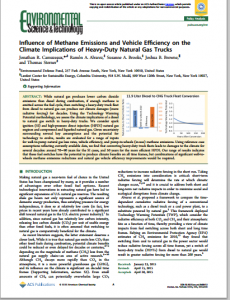Full Title: Influence of Methane Emissions and Vehicle Efficiency on the Climate Implications of Heavy-Duty Natural Gas Trucks
Author(s): Jonathan R. Camuzeaux, Ramon A. Alvarez, Susanne A. Brooks, Joshua B. Browne, and Thomas Sterner
Publisher(s): Environmental Science and Technology Journal
Publication Date: May 1, 2015
Full Text: Download Resource
Description (excerpt):
While natural gas produces lower carbon dioxide emissions than diesel during combustion, if enough methane is emitted across the fuel cycle, then switching a heavy-duty truck fleet from diesel to natural gas can produce net climate damages (more radiative forcing) for decades. Using the Technology Warming Potential methodology, we assess the climate implications of a diesel to natural gas switch in heavy-duty trucks. We consider spark ignition (SI) and high-pressure direct injection (HPDI) natural gas engines and compressed and liquefied natural gas. Given uncertainty surrounding several key assumptions and the potential for technology to evolve, results are evaluated for a range of inputs for well-to-pump natural gas loss rates, vehicle efficiency, and pump-to-wheels (in-use) methane emissions. Using reference case assumptions reflecting currently available data, we find that converting heavy-duty truck fleets leads to damages to the climate for several decades: around 70−90 years for the SI cases, and 50 years for the more efficient HPDI. Our range of results indicates that these fuel switches have the potential to produce climate benefits on all time frames, but combinations of significant well-to-wheels methane emissions reductions and natural gas vehicle efficiency improvements would be required.
